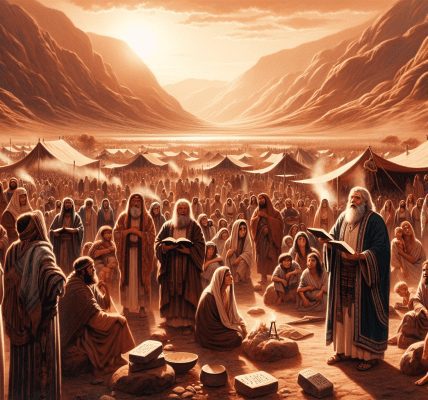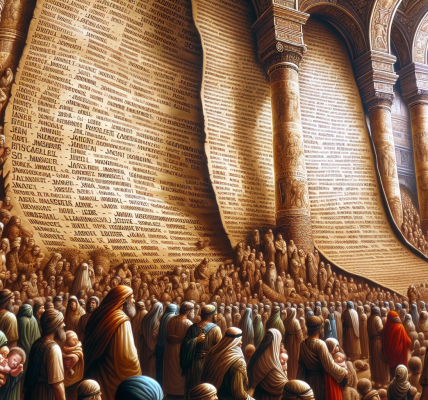Once upon a time, Samuel, a prophet, was directed by Jehovah, the Most High, to anoint Saul as King over Israel. This divine decree echoed with glory and strength over the Land of Israel. But Saul’s reign was to be tested early on, as Jehovah, remembering the cruelty of the Amalekites to his people, the Israelites, during their exodus from Egypt, decided to punish them. Saul was given a divine edict to vanquish Amalek, destroying all that belonged to them, showing no mercy, sparing neither man, woman, nor child nor even their beasts.
Summoning an impressive army, Saul journeyed to Telaim and prepared his troops for the battle to come. There, two hundred thousand foot soldiers and ten thousand men from Judah gathered, ready to enact the will of Jehovah. Word of this holy mission had reached the Kenites, friends of the children of Israel, and they were spared from the impending carnage.
Saul’s army was victorious, and the lands of the Amalekites were destroyed, from Havilah to Shur. Even Agag, the King of the Amalekites, was captured, and the people were decimated. But Saul faltered, sparing Agag and the best of the Amalekite livestock, marking his first deviation from Divine orders.
Meanwhile, Samuel was filled with divine wrath when he learned of Saul’s disobedience. He prayed to Jehovah throughout the night, detailing Saul’s transgressions. He journeyed at dawn’s light to confront Saul, who, smug with victory, boasted of his fulfilment of Jehovah’s commands. Alas, his untruth was apparent; the sounds of the spared livestock echoed in Samuel’s ears, exposing Saul’s insolence.
Though Saul tried to justify his transgressions, Samuel silenced him, explaining the weight of Saul’s disobedience. Even the offering of the spared livestock in sacrifice was insignificant compared to the act of obeying Jehovah. Saul’s disobedience was akin to the vilest of sins – witchcraft, idolatry, and teraphim – and his rebellion led to his rejection by Jehovah as king.
Saul, stricken with guilt, begged Samuel for forgiveness. Yet, it was too late – his crown was taken away, symbolized by a piece of Samuel’s robe that ripped as Saul tried to seize him. Jehovah, unyielding and steadfast, would not reverse his judgement.
Still, Saul, now humbled and repentant, begged Samuel to remain by his side as he faced his people so that he could continue to worship Jehovah. Samuel, moved by Saul’s plea, agreed to stand with him.
Samuel then ordered the presentation of King Agag, who, believing he was spared of death, came cheerfully. Yet the bitterness of death was merely delayed. As a tribute to all the mothers the Amalekite king had made childless with his sword, Samuel, wielding the sword of divine retribution, ended Agag’s life.
In the wake of this, Samuel journeyed to Ramah, leaving Saul to return to his home in Gibeah, ousted from his divinely anointed kingship. It was a painful parting; Samuel mourned Saul’s fall, marking the end of their bond. For Jehovah, true to his eternal nature, had had a change of heart, regretting the day Saul was made King over Israel.



